七下U8知识点
七年级下册英语知识点总结u8
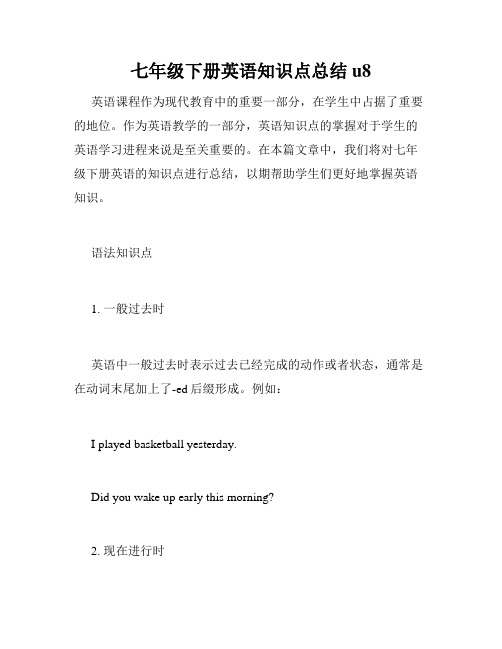
七年级下册英语知识点总结u8英语课程作为现代教育中的重要一部分,在学生中占据了重要的地位。
作为英语教学的一部分,英语知识点的掌握对于学生的英语学习进程来说是至关重要的。
在本篇文章中,我们将对七年级下册英语的知识点进行总结,以期帮助学生们更好地掌握英语知识。
语法知识点1. 一般过去时英语中一般过去时表示过去已经完成的动作或者状态,通常是在动词末尾加上了-ed后缀形成。
例如:I played basketball yesterday.Did you wake up early this morning?2. 现在进行时现在进行时用来描述现在正在发生的动作,通常是在动词后面加上-ing后缀。
例如:I am studying English right now.She is watching TV at home.3. 现在完成时现在完成时用来描述已经完成的动作,通常是由have/has + 过去分词组成。
例如:He has finished his homework.Have you seen this movie before?4. 情态动词情态动词通常用来表示可能性、推测、建议等。
常见的情态动词有can、could、may、might、should、would、must等。
例如:You should study harder to pass the exam.He might be late for the meeting.5. 一般将来时一般将来时通常用来表示将来会发生的事情,通常是由will或者be going to组成。
例如:He will visit his grandparents next weekend.I am going to attend a party tonight.词汇知识点1. 数字数字在英语中也非常重要,我们需要掌握基本的数字0-9以及表示时间和日期的数字。
例如:Today is October 7th, 2021.There are 60 seconds in one minute.2. 颜色在英语中表示颜色的单词也非常重要。
七年级下册unit8 知识点
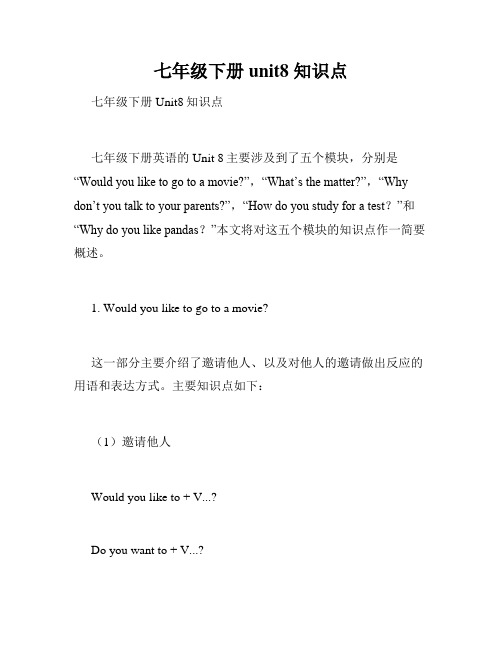
七年级下册unit8 知识点七年级下册Unit8知识点七年级下册英语的Unit 8主要涉及到了五个模块,分别是“Would you like to go to a movie?”,“What’s the matter?”,“Why don’t you talk to your parents?”,“How do you study for a test?”和“Why do you like pandas?”本文将对这五个模块的知识点作一简要概述。
1. Would you like to go to a movie?这一部分主要介绍了邀请他人、以及对他人的邀请做出反应的用语和表达方式。
主要知识点如下:(1)邀请他人Would you like to + V...?Do you want to + V...?(2)接受邀请Sure. / Of course. / I’d love to.(3)谢绝邀请Sorry, I can’t. / I’m busy. / Maybe another time.2. What’s the matter?这一部分主要介绍了询问他人情况,以及表达自己身体不适的方式。
主要知识点如下:(1)询问他人情况What’s wrong? / What’s the matter?(2)回答他人询问I have a headache / a stomachache / a cold, etc.(3)表达希望得到帮助Can you help me?3. Why don’t you talk to your parents?这一部分主要介绍了向他人提出建议和劝告的方式。
主要知识点如下:(1)向他人提出建议和劝告Why don’t you...?You should...Maybe you could...(2)接受建议和劝告That’s a good idea. / I’ll try that.4. How do you study for a test?这一部分主要介绍了讨论学习策略和方法的方式。
仁爱英语七年级下册unit8知识点
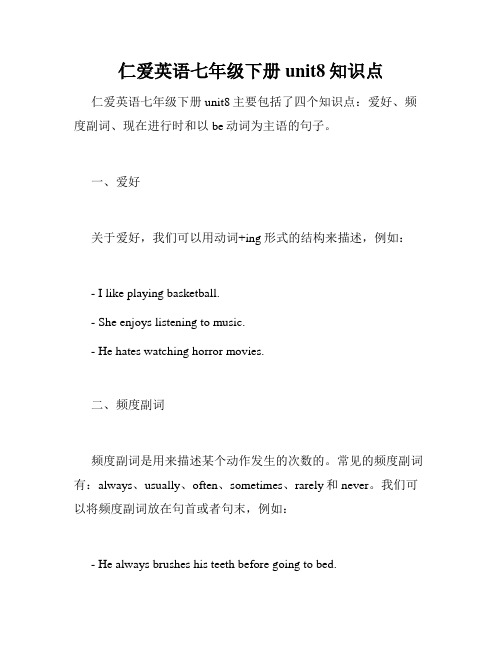
仁爱英语七年级下册unit8知识点仁爱英语七年级下册unit8主要包括了四个知识点:爱好、频度副词、现在进行时和以be动词为主语的句子。
一、爱好关于爱好,我们可以用动词+ing形式的结构来描述,例如:- I like playing basketball.- She enjoys listening to music.- He hates watching horror movies.二、频度副词频度副词是用来描述某个动作发生的次数的。
常见的频度副词有:always、usually、often、sometimes、rarely和never。
我们可以将频度副词放在句首或者句末,例如:- He always brushes his teeth before going to bed.- I usually eat breakfast at 7 o'clock in the morning.- They sometimes go to the park on weekends.- She rarely drinks coffee because it makes her nervous.- We never miss our English class.三、现在进行时现在进行时用来描述正在进行的动作,其结构为:be动词+现在分词。
例如:- He is playing basketball with his friends now.- They are watching TV in the living room.- She is studying English at the library.- We are listening to music in the classroom.需要注意的是,某些动词不宜用于现在进行时,例如感官动词(see、hear、smell、notice、feel、taste)和状态动词(be、seem、appear、look、feel、sound、taste)。
仁爱英语七年级下册知识点归纳u8
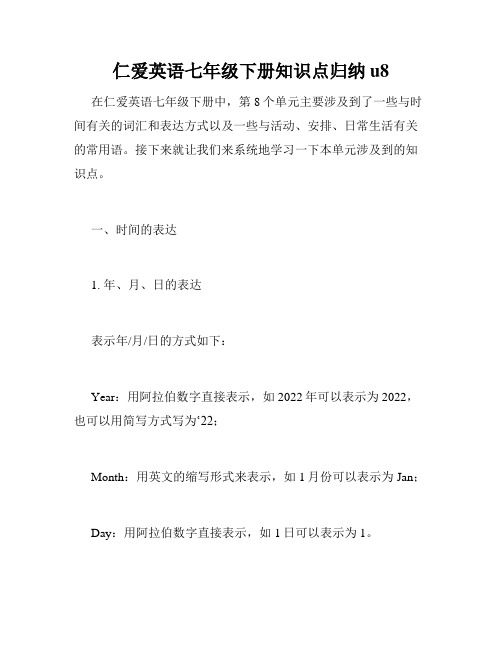
仁爱英语七年级下册知识点归纳u8在仁爱英语七年级下册中,第8个单元主要涉及到了一些与时间有关的词汇和表达方式以及一些与活动、安排、日常生活有关的常用语。
接下来就让我们来系统地学习一下本单元涉及到的知识点。
一、时间的表达1. 年、月、日的表达表示年/月/日的方式如下:Year:用阿拉伯数字直接表示,如2022年可以表示为2022,也可以用简写方式写为‘22;Month:用英文的缩写形式来表示,如1月份可以表示为Jan;Day:用阿拉伯数字直接表示,如1日可以表示为1。
同时,表示时间的单词还有以下几个:Hour:表示每小时,如6点表示为6 o'clock;Minute:表示分钟,如6点10分可以表示为10 minutespast/after 6 o'clock;Second:表示秒,如6点10分30秒可以表示为30 seconds past/after 6 o'clock。
2. 以“时间+to”的方式表示使用“时间+to”的方式表示当前时间离下一个时间点还有多少时间,如:It's ten to seven. 表示现在是6点50分左右;It's three minutes to noon. 表示现在距离中午12点还有3分钟。
3. 以“时间+past/after”的方式表示这种方式与“时间+to”的方式类似,只是表达的含义不同。
这里表示的是当前时间距离上一个时间点有多久,如:It's twenty minutes past eight. 表示现在是8点20分左右;It's ten minutes after four. 表示现在是4点10分左右。
二、与活动、安排、日常生活有关的常用语1. What time is it?表示“现在几点钟了?”2. I have to be at school by 7:30. 表示“我必须在7:30之前到达学校。
”3. What's your schedule like today?表示“你今天的日程安排怎么样?”4. I have a lot of homework to do. 表示“我有很多作业要做。
七年级下册英语u8语法知识点
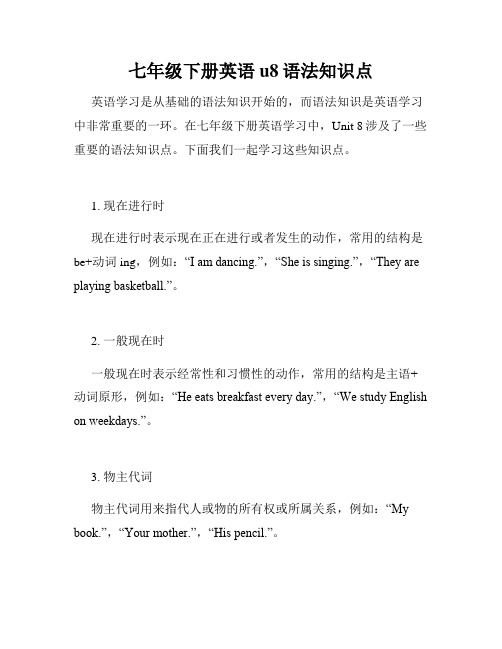
七年级下册英语u8语法知识点英语学习是从基础的语法知识开始的,而语法知识是英语学习中非常重要的一环。
在七年级下册英语学习中,Unit 8涉及了一些重要的语法知识点。
下面我们一起学习这些知识点。
1. 现在进行时现在进行时表示现在正在进行或者发生的动作,常用的结构是be+动词ing,例如:“I am dancing.”,“She is singing.”,“They are playing basketball.”。
2. 一般现在时一般现在时表示经常性和习惯性的动作,常用的结构是主语+动词原形,例如:“He eats breakfast every day.”,“We study English on weekdays.”。
3. 物主代词物主代词用来指代人或物的所有权或所属关系,例如:“My book.”,“Your mother.”,“His pencil.”。
4. 疑问词疑问词用来引导疑问句,例如:“What is your name?”,“Where do you live?”,“Who is your teache r?”。
5. 情态动词情态动词用来表示说话人在语气和态度上的情感色彩,例如:“can”表示能力,“may”表示许可,“should”表示建议等。
6. 句型转换在英语学习中,句型转换是非常重要的一项能力。
学生需要掌握如何将一种句型转换成另一种句型,例如将一般现在时转换成现在进行时,在“主语+动词原形”的结构中加入be动词的ing形式,例如:“I eat breakfast every day.”转换成“I am eating breakfast now.”。
以上是七年级下册英语Unit 8的一些重要语法知识点,希望同学们能够掌握好这些知识点,在英语学习中取得更好的成绩。
七年级下unit8知识点
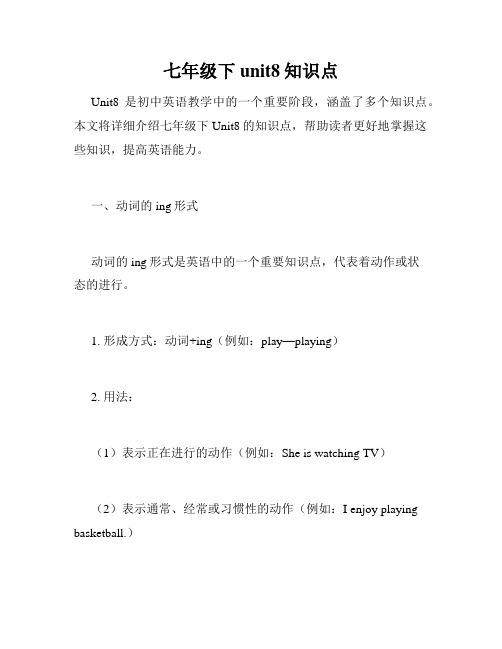
七年级下unit8知识点Unit8是初中英语教学中的一个重要阶段,涵盖了多个知识点。
本文将详细介绍七年级下Unit8的知识点,帮助读者更好地掌握这些知识,提高英语能力。
一、动词的ing形式动词的ing形式是英语中的一个重要知识点,代表着动作或状态的进行。
1. 形成方式:动词+ing(例如:play—playing)2. 用法:(1)表示正在进行的动作(例如:She is watching TV)(2)表示通常、经常或习惯性的动作(例如:I enjoy playing basketball.)(3)作定语或表语(例如:The dancing girl is very beautiful.)二、一般现在时态一般现在时态是英语中最基础的时态,具有多种用法。
1. 形式:主语+动词原形(第三人称单数需加s)2. 用法:(1)表示现在正在进行的动作(例如:I am listening to music.)(2)表示经常性的、习惯性的或普遍性的事情(例如:She often watches TV.)(3)表示判断、命令或表示常态(例如:The sun rises in the east.)三、时间状语时间状语在英语中也是重要的语法 unit,用来表达动作、事情发生的时间或持续的时间等。
1. 常见时间状语(时间点):(1)now 现在(2)today 今天(3)tonight 今晚(4)tomorrow 明天(5)yesterday 昨天(6) last week/month/year 上周/上月/去年2. 常见时间状语(时间段):(1)all day 整天(2)every day 每天(3)once a week/month/year 每周/月/年一次(4)in the morning/afternoon/evening 在早上/下午/晚上四、形容词的比较级和最高级形容词的比较级和最高级涉及到了英语中的等级语法,以便用来描述某两个或多个人或事物之间的差异。
七年级英语下册 unit8 知识点归纳
七年级英语下册 unit8 知识点归纳七年级英语下册unit8知识点归纳一、基本知识点1si生病的,有病的;可在句中作表语aruldntebeausesheissi也可作定语asihild【区别ill】ill与si同义;但是只在句中做表语,不做定语。
aruldntebeausesheisill2heerup变得高兴;振奋起来Thegdnesheeredupeverneinurlass3giveut分发;散发,相当于handut,Theteaherisgivingut/handingutthetestpapers givesthuttsb意为4vlunteer【名词】志愿者【动词】义务做,自愿做,Thegirlsuldvlunteerinanafter-shlstudprgrausedtdsth过去/曾经做某事,表示过去的习惯、动作或状态,并强调现在已经不再存在或发生。
Thereusedtbe 6alne【形容词】独自一人的,无感情色彩:Theusiianenedlivingalneandritingsngshiselflnel孤独寂寞的,带有很强的感情色彩,可做表语或定语。
Thelnelbisntlneln7arefrsb/sth照顾;照料„„are【名词】小心,关心taearef=lafter→【动词】areabutsb/sth关心,在意某人/事→【形容词】→【副词】8suh“这样的,这种,如此”,用于修饰名词suh+a/an+形容词+单数名词:suh+形容词+复数名词/不可数名词:如果名词前被an,uh,fe,little修饰时,只能用s,而不用suh:sansihildren/slittletie9trutfr…参加„选拔,争取成为„ThirtftballplaerstriedutfrtheBestPlaerftheea rtrut试用,试验10urne【名词】旅行,行程;trip【名词】多指短途旅行;travel【名词、动词】travelarundtherld→【名词】traveler旅行者11【复习】bebusithsthbebusdingsth12【复习】trdingsthtrtdsthtrne’13【复习】14raisene集资,筹钱;raisenefr…为„„筹钱raise【动词】举起;提高;募集1eep【动词】eep+名词,保留;eep+形容词,保持16【形容词】bren破损的,出毛病的;blind瞎的,失明的;deaf聋的;disabled有残疾的,丧失能力的在句中做定语和表语:17aeitpssibletdsth使做某事成为可能,uhelpedtaeitpssiblefrethaveLuaeit+形容词tdsth使做某事成为„;thin/findit+形容词tdsth18aeadifferenet…对„„有影响;对„„有作用,differene前可以用n,an,se,uh等修饰,如TherainadendifferenetthegaeHard-ringaesuhdifferenet stud19diffiult【可数/不可数】表示抽象意义的“困难”时为不可数;表示具体的“难题、难事”时为可数;20train 【动词】训练,trained为过去分词,可做定语,意为“受过训练的”atraineddg,Everneisexitedabutthegdnes。
七年级下册英语unit8知识点归纳
七年级下册英语unit8知识点归纳Unit 8主要内容是关于旅游和文化的话题,以下是本单元的知识点归纳。
一、词汇1. tourist (n.) 游客2. sightseeing (n.) 景点游览3. guide (n.) 导游4. souvenir (n.) 纪念品5. cultural (adj.) 文化的6. tradition (n.) 传统7. landmark (n.) 地标8. monument (n.) 纪念碑9. statue (n.) 雕像10. palace (n.) 宫殿11. temple (n.) 寺庙12. mosque (n.) 清真寺13. cathedral (n.) 大教堂14. cuisine (n.) 烹饪(指特定国家或地区的菜肴)15. dish (n.) 菜肴二、语法1. be going to + 动词原形表示将来计划要做的事情。
例如:I am going to visit London next month.下个月我计划去伦敦旅游。
2. must + 动词原形表示必须要做的事情。
例如:You must buy some souvenirs for your family.你必须给家人买些纪念品。
3. should + 动词原形表示应该做的事情。
例如:You should try the local cuisine.你应该尝试一下当地的美食。
4. wh- 问句感叹句与疑问句中常用的疑问词。
例如:What a beautiful palace!这座宫殿真漂亮!Where can we find some local souvenirs?我们在哪里可以找到当地的纪念品?5. 不定式(to + 动词原形)表示目的或原因。
例如:We visited Beijing to see the Great Wall.我们去北京旅游是为了看长城。
6. 形容词的比较级用于表示两个事物之间的比较。
七(下)U8 知识点总结
Unit 8 知识点总结Part I Words & Phrases1. 地点名词:a post office 邮局a police station 警察局 a restaurant饭店a hotel 旅馆a bank 银行 a hospital 医院 a pay phone 付费电话2.表示方位的介词:across from 在…对面,near 在…附近, around 在。
周围near here = around here 这附近next to 紧挨着,behind 在…后面, between A and B 在A和B之间,in front of 在…前面(外部), in the front of在…前面(内部)on…street 在。
街上e.g.(1)The pay phone is __behind________ the hospital, so we can’t see it.(2)The bank is _____on________ Center Street.(3)The blackboard is _____in the front of____ the classroom. (在…前面)(4)There is a tree _____in front of___________ the classroom. (在…前面)(5)Jack sits __between___ Rick ___and___ Dave, so Dave is __next to___ Jack.(6)The post office is ____across from____ the restaurant.(在…对面)(7) Kangping Road(Rd)康平路Kangning Street(Str)康宁街Zhengzhou NO.96 Middle School is ___on_____ Kangning Street3. How can I help you? =What can I do for you? 我可以帮你吗?I am new in town. 我新来这个城镇。
七年级下册unit 8知识点
七年级下册unit 8知识点本文将针对七年级下册Unit 8内容进行详细介绍,包括单词、短语、语法和阅读等方面,帮助同学们更好地掌握英语知识点,从而取得更好的成绩。
一. 单词篇1. traditional: 传统的,具有传统的特点、习惯或方法等。
例句:The wedding ceremony was very traditional, with lots of customs and rituals.2. custom: 习惯,风俗,习俗,传统。
例句:It's a custom in many countries to give gifts to friends and family during the holiday season.3. celebrate: 庆祝,庆贺,表示喜悦。
例句:We celebrated his birthday by having a big party at his house.4. festival: 节日,庆典。
例句:The Spring Festival is the most important festival in China.5. decoration: 装饰,装饰品。
例句:She loves to buy special decorations for her Christmas tree.二. 短语篇1. dress up: 穿上盛装,打扮得漂漂亮亮。
例句:I plan to dress up in a traditional costume for the festival.2. hang out: 闲逛,出去玩。
例句:On weekends, I like to hang out with my friends at the mall.3. put up: 上挂,悬挂。
例句:We put up some Halloween decorations in the classroom.4. make noise: 制造噪音。
- 1、下载文档前请自行甄别文档内容的完整性,平台不提供额外的编辑、内容补充、找答案等附加服务。
- 2、"仅部分预览"的文档,不可在线预览部分如存在完整性等问题,可反馈申请退款(可完整预览的文档不适用该条件!)。
- 3、如文档侵犯您的权益,请联系客服反馈,我们会尽快为您处理(人工客服工作时间:9:00-18:30)。
Section A在春天/夏天/秋天/冬天
_____________________________放风筝___________________
去游泳____________________爬山________________堆雪人
_______________
学习做某事______________例:I learned to swim last year.
Section B最佳(不)做某事________________出去______________
需要做某事_______________例:__________________________
记住做某事_________________例:_____________________________
中国的大部分地区_______________________后来,以后,随后
______________
Section C变暖____________复苏,复活_______________________树变绿
___________________
(花)开放(书)出版,发行________________
处于…之后______________例:Fall comes after summer.收获的季节
_________________
忙于做某事______________________例:It is the harvest season, and the farmers are busy harvesting.
The sun shines ____________ (bright).Sometimes it often rains
_______________ (heavy).
The wind blows _____________(strong).Sometimes it rains
______________(sudden).
Section D散步__________________休息______________________
看见某人正在做某事__________________例:
__________________________________________
1.春天天气怎么样?(两个)
___________________________=_______________________________
2.---春夏秋冬,你最喜欢哪个季节?---我最喜欢夏天。
/很难说。
4.---气温多少?---低温-8,高温9。
5.你最佳了解八月份例外地区的天气。
Unit 8 Topic 2
1.周游全国travel around the country回到go back to和……团聚get together with…places of interest名胜;hope /wish to do sth希望做某事;
2.wish sb to do sth希望某人做某事;each of us/you我们/你们中的每一个单数Each of you has a good plan for the holidays.Each of the children is busy cleaning the classroom.
6.the Palace Museum故宫;
7.take off脱下;起飞;
8.put on穿上;
9.gift money压岁钱;
10.be different from -----与例外;
11.point to / at指向……
12.pass sth to sb = pass sb sth把……传给某人;14.wrap sth in ------用……包裹……
15.go on a trip去旅行;
Topic 3
1.Spring Festival春节;
ntern Festival元宵节;
3.Christmas圣诞节;
4.Thanksgiving感恩节;
5.each other = one another彼此;
6.not ----- until直到……才……
7.play a trick/ joke on sb开……的玩笑;
8.show sth to sb展示某物给某人;
9.prepare for ----为……做准备;
10.put up举起;挂起;
11.stay up熬夜;
12.at midnightxx午夜;
13.knock on敲;打……
14.go up上升;16.congratulations on sth祝贺某事
17.congratulations to sb祝贺某人
18.后加doing的词组
19.practice doing
20.enjoy doing
21.feel like doing
22.finish doing
23.can’t help doing
24.look forward to doing
25.pay attention to doing
26.make a contribution to doing
27.give up doing。
